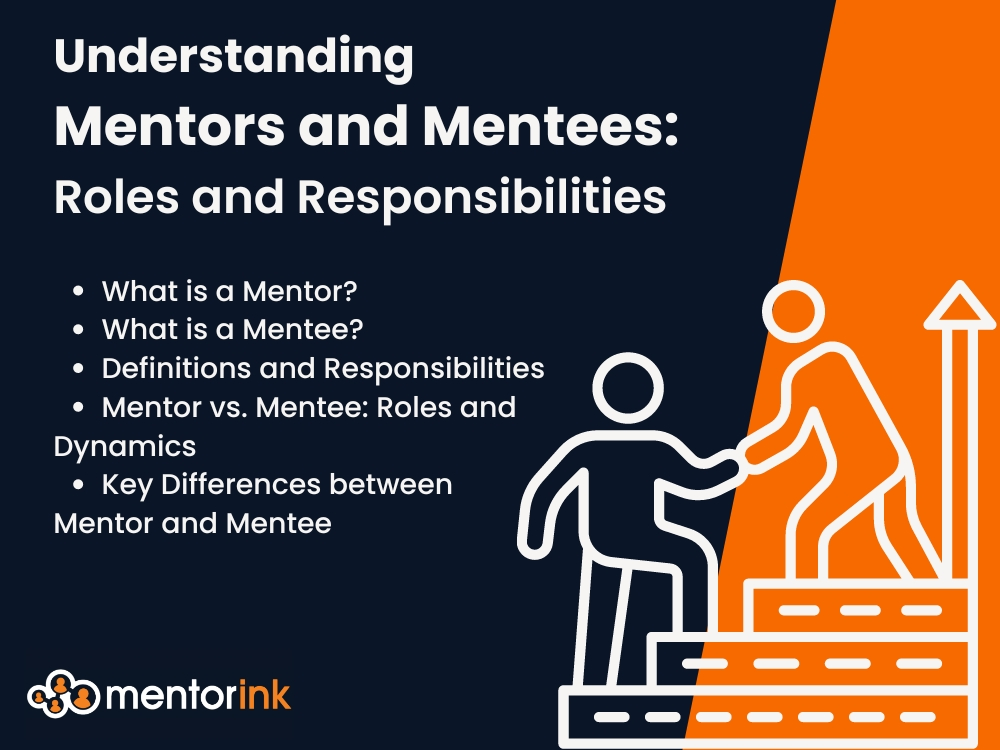
Both mentors and mentees are important individuals in personal and professional development. Any mentoring relationship can be optimized by meeting the responsibilities of these roles. Statistics show that 89% of mentees go on to mentor others, proving the positive cycle that mentoring relationships bring. (Source) This guide will explore the meaning and responsibilities of mentors and mentees and the dynamics that make these relationships successful.
What is a Mentor? Definition and Responsibilities
In addition to being a coach, role model and advisor, a mentor is also a trusted friend. They provide guidance, wisdom and support to a less experienced individual, known as a mentee. The role of mentors combines teaching, coaching and counseling to help mentees overcome challenges and achieve their personal and professional goals.
Mentor Responsibilities
Mentors also act as adaptive role models, trainers and advisors to support the growth and development of their mentees. Effective mentoring goes beyond simply sharing knowledge; it requires understanding and addressing the unique needs of each mentee. It is a very important point to understand that each mentee is different and needs to be treated and adapted accordingly. Mentors have a number of important tasks to help their mentees develop:
- Guidance and Advice: Sharing experiences and insights to help mentees make wise decisions.
- Support and Encouragement: Offering emotional and inspirational support to boost the mentee’s self-confidence.
- Knowledge Sharing: Providing important knowledge and skills.
- Feedback: Providing useful criticism to help the mentee develop and grow.
- Networking: Helping mentees connect with valuable contacts and opportunities that can help them advance in their careers.
- Skill Development: Assisting mentees to develop and improve their skills.
- Goal Setting: Helping mentees set and achieve realistic and meaningful goals.
- Encouraging Growth: Motivating mentees to step out of their comfort zone and continuously improve.
A mentor’s job is not limited to teaching; they must listen, understand and adapt to their mentee’s needs to build a positive and beneficial bond with them.
As Oprah Winfrey once said, “A mentor is someone who allows you to see the hope inside yourself”
What is a Mentee? Understanding Roles and Duties
A mentee is someone who is willing to grow under the guidance of a more experienced individual, known as a mentor. The mentee’s biggest responsibility is to actively participate in the mentoring relationship and learn from the mentor. Although mentoring can be beneficial at any point in a person’s career, mentees are usually people who are just starting out.
Mentee Responsibilities
The role of a mentee goes beyond just receiving guidance. It involves actively participating in a partnership where values and goals are shared. Mentees should be proactive, communicate effectively and be open to feedback. They need to understand their goals and be committed to their personal and professional development. There are also important responsibilities that mentees must fulfill for the mentoring relationship to be successful:
- Asking for Advice: Approaching mentors with specific questions and problems.
- Active Listening: Listening carefully to the advice given and acting.
- Being Proactive: Taking the initiative for their own development.
- Showing Appreciation: Expressing gratitude to build a stronger bond.
- Active Participation: Being present and prepared for meetings.
- Being Open to Feedback: Accepting constructive criticism and using it to improve.
- Follow- through: Implementing the advice and strategies discussed with the mentor.
- Communication: Maintain open and honest communication with the mentor, including sharing progress and challenges.
- Goal Setting: Defining personal and professional goals to guide the mentoring relationship.
- Taking Responsibility: Taking ownership of their development and actively participating in the mentoring process.
Mentees should take responsibility for their own learning and actively participate in their development using their mentor’s advice.
As Galileo once said, “You cannot teach a man anything. You can only help him find it within himself.”
Mentors and Mentees: Roles and Dynamics
As we mentioned earlier, the mentor-mentee relationship is crucial for both professional and personal development. To maximize this partnership, both mentors and mentees need to be fully committed, fulfill their responsibilities and maintain their professionalism and authenticity. This relationship has many benefits, including the following:
- Fostering Growth: Learning and development on both sides through the exchange of ideas.
- Career Development: Providing mentees with opportunities and insights that can help them advance more wisely in their careers.
- Personal Development: Encouraging both mentors and mentees to reflect on their experiences and grow personally.
- Networking: Expanding professional networks that can open doors to new opportunities.
- Self-confidence Boost: Effective mentoring can boost mentees’ self-confidence.
- Satisfaction for Mentors: Mentors derive satisfaction from helping others and developing leadership skills.
Although mentors are in a teaching role, they can gain valuable knowledge from their mentees. Similarly, mentees can make important contributions to their mentors, even though they are primarily learners. The reciprocity of this relationship should not be forgotten at any stage of the relationship.
Key Differences between Mentors and Mentees
While there are many common benefits, the mentor-mentee relationship also involves distinct differences that need to be recognized and respected. Mentoring is important because; it fosters mutual growth through shared learning and guidance, and understanding these roles ensures that both sides benefit fully from the experience. While the primary goal of both mentors and mentees is to develop, they have different roles in this process. Recognizing and respecting these differences is essential to get the most out of this mutual relationship:
- Experience Level: Mentors have more experience than mentees.
- Guidance and Learning: Mentors primarily provide guidance, while mentees focus on learning.
- Knowledge Sharing: Mentors pass on valuable information, while mentees use constructive criticism to improve.
- Support and Involvement: Mentors provide encouragement and act as role models. Mentees actively participate and take responsibility for their development.
- Roles and Responsibilities: Mentors manage the relationship, while mentees implement the advice.
A good mentoring relationship depends on a good definition of roles and expectations, which can be achieved by acknowledging these differences. These shared benefits and differences provide valuable insights that individuals will carry throughout their lives and pass on to others.
Understanding the roles and responsibilities of mentors and mentees is crucial for a successful mentoring relationship. Clear definitions and expectations create a structured and supportive environment in which both mentors and mentees can thrive. By embracing and actively participating in their roles, individuals achieve significant personal and professional growth. Discussing your boundaries, values and aspirations before starting a mentoring relationship will help you understand each other better and build a stronger bond. If you are struggling to build a strong bond between mentor and mentee, consider exploring some useful strategies.


